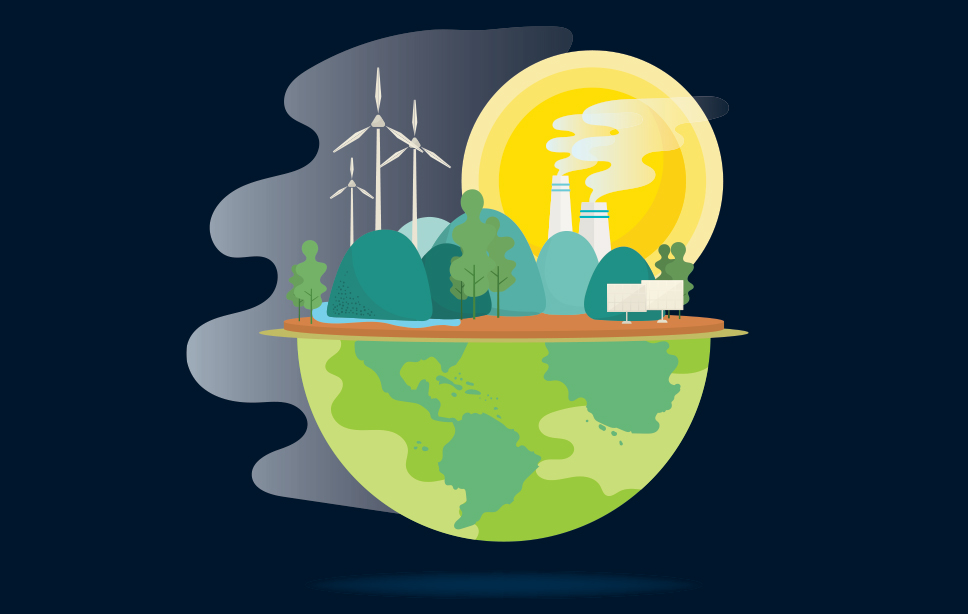4 min read
Could more countries turn their backs on the E&P industry?
![]() Archer Knight
:
August 30, 2021
Archer Knight
:
August 30, 2021

Scott Mitchell on the implications from the UN’s damning climate report.
The recent release of the IPCC report on climate change brings into focus the fact that we’re now on the brink of irreversible global warming.
UN Secretary-General Antonio Guterres described the findings of the report as a ‘code red for humanity’. Not only that, in a major intervention for the energy industry, he’s called for an end to fossil fuel exploration and production (E&P).
In this article, we highlight the key findings of the IPCC report and identify fossil fuel exploration and production policies governments have enacted which directly address the Secretary-General’s concerns and statements following the release of the IPPC report.
IPPC report findings
With COP26, the global climate change conference only weeks away, the Intergovernmental Panel on Climate Change (IPCC) issued its sixth assessment report on global climate change in August.
The findings paint a bleak picture for our planet’s future. Without intervention to reduce CO2 emissions, it is clear we are facing a devastating future.
The key findings include:
- Atmospheric CO2 is at a 2-million-year peak. And the last decade was hotter than at any time over the last 125,000 years
- Specific extreme weather events, such as North America’s June heatwave would be “virtually impossible” without human-made climate change
- Scientists have narrowed the range of temperature response to greenhouse emissions, thus allowing for a more accurate long-term forecast of the global climate
- Cutting emissions to zero will cease heating and temperatures will stabilize in a couple of decades
- Building consensus of these findings among all nations will be a powerful tool to help deliver policies that can counteract global warming
- In his statement, Secretary-General Guterres called the report a ‘code red for humanity’ and wants it to sound the ‘death knell’ for coal and fossil fuel.
He wants all new fossil fuel exploration and production to stop, and subsidies to shift into renewable energy.
These countries are leading the push to curtail E&P activity – will more follow
A number of nations have already enacted policies before this report was published to eliminate future E&P activity. These policies typically fall into the following categories:
- No further production after a certain date
- Ban on future exploration activity
- Outright ban of all exploration and production activity
- No award of new exploration licenses
Five European countries have passed laws to curtail E&P activity.
France
In 2017, France banned oil & gas production in its territories by the year 2040. Additionally, no new permits for exploration and production will be issued past the deadline.
Denmark
In 2020, Denmark banned all new exploration activity, and plans to end all its fossil fuel production by 2050.
Spain
In May 2021, Spain passed a new climate law which ends fossil fuel production by 2042. It also bans all new exploration with immediate effect.
Ireland
Ireland has introduced legislation to ban the issuance of new oil & gas exploration licenses.
Portugal
In 2015, Portugal had 15 active exploration licenses. Since then, under pressure from activists, the government has cancelled them all. The remaining two were halted in September 2020, effectively ending the country’s E&P industry.
It should be noted that none of the countries listed here have economies that are heavily reliant on fossil fuel production. Denmark has a significant oil & gas industry. However, its production has been declining for many years with no significant new discoveries.
However, the motivation behind these policies, is often to encourage the larger fossil fuel producers to follow suit, and transition their economies to be carbon neutral by 2050.
Elsewhere around the world we have also seen significant fossil fuel extraction laws passed by Greenland, Belize, Costa Rica and New Zealand.
Greenland
Believed to have massive untapped oil & gas resources. However, the new Greenland government banned all new oil & gas exploration in July 2021. Its policies are aimed at supporting renewable resources and protecting fisheries and the environment.
Belize
Ended all offshore E&P activity in 2018. Although the country only produces 3,000 barrels a day, its offshore region offers significant resource potential. The Belize government is concerned about the harm oil & gas development could have on the reef system, one of the largest and most diverse on the planet.
Costa Rica
Has a temporary decree to prohibit oil & gas exploration. Activists are pushing to make this a permanent law.
New Zealand
The government announced in April 2018 it would not grant new exploration licenses. Since then, all active licenses have been relinquished, effectively putting an end to country’s oil & gas industry.
Investment in renewable energy sources needed to plug the energy gap
Given the pressure being exerted on governments by climate-change activists, we are likely to see more countries follow suit and put an end to global oil & gas exploration.
To date, we have not seen any of the major producing countries limit activity. However, as time passes and pressures mount, we may soon see the more progressive fossil fuel economies take bold steps towards limiting oil & gas extraction activities.
Consequently, the renewable energy sector will need to grow significantly to meet future energy demand.
Where does this leave energy sector companies?
The offshore energy sector is sprawling and complex. The businesses working in it are continually facing new challenges and enhanced competition.
With energy transition the sector is probably facing its biggest challenge yet. The big switch from fossil fuels to renewables will require cleaner energy generation and mass electrification. It’s one of the most talked about subjects globally but also one of the least understood.
Where will the new opportunities lie for service companies? Where do the old and new energy worlds overlap and where will companies need to upskill.
Archer Knight’s AMi market intelligence subscription can help give you a more complete picture. We tailor AMi to your individual services, keeping your informed in real time of the key macro and microeconomic influences and actors.
We help you gather competitive intelligence on the sector – which in turn helps you make better decisions.
To discover more about AMi and our energy market services, contact Scott Mitchell on smm@archerknight.com.

3 min read
How to bounce back – relationships & resilience in the supply chain
There’s no silver bullet, but the industry needs to learn lessons from previous adversity As we continue to navigate through uncharted...

1 min read
Archer Knight wins major market intelligence contract with Neptune Energy
Leading independent E&P company to use the Alliance Market Intelligence (AMi) service for its employees worldwide. Archer Knight has hailed a...

1 min read
Offshore Energies UK (OEUK) recently published their Economic Report 2022
Offshore Energies UK (OEUK) recently published their Economic Report 2022. The report looks at both energy prices & the offshore energy sector's...



